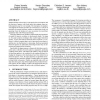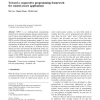QUESTA
2011
14 years 9 months ago
2011
QRE
2011
14 years 9 months ago
2011
156
click to vote
PVLDB
2011
14 years 9 months ago
2011
Users of MapReduce often run into performance problems when they scale up their workloads. Many of the problems they encounter can be overcome by applying techniques learned from ...
232
click to vote
PVLDB
2011
14 years 9 months ago
2011
With the recent surge of social networks such as Facebook, new forms of recommendations have become possible – recommendations that rely on one’s social connections in order t...
136
click to vote
PVLDB
2011
14 years 9 months ago
2011
New hardware platforms, e.g. cloud, multi-core, etc., have led to a reconsideration of database system architecture. Our Deuteronomy project separates transactional functionality ...
142
click to vote
PVLDB
2011
14 years 9 months ago
2011
Matching problems are ubiquitous. They occur in economic markets, labor markets, internet advertising, and elsewhere. In this paper we focus on an application of matching for soci...
133
click to vote
PVLDB
2011
14 years 9 months ago
2011
Studies find that at least 20% of web queries have local intent; and the fraction of queries with local intent that originate from mobile properties may be twice as high. The eme...
165
click to vote
PUC
2011
14 years 9 months ago
2011
OPEN is an ontology-based programming framework for rapid prototyping, sharing, and personalization of context-aware applications. Unlike previous systems that provide programming ...


